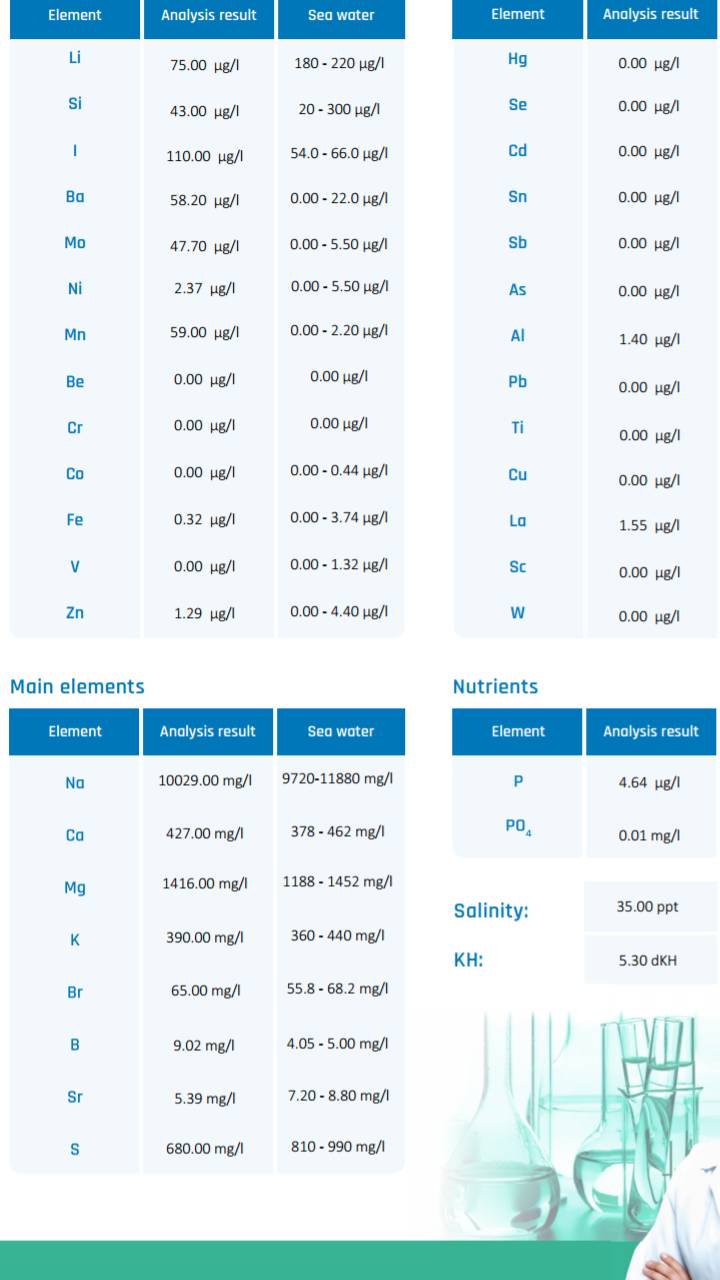You are using an out of date browser. It may not display this or other websites correctly.
You should upgrade or use an alternative browser.
You should upgrade or use an alternative browser.
Saltmix Parameters bring on the test results
- Thread starter jason2459
- Start date
jason2459
Well-known member
Does anyone have a triton test of freshly made fritz salt ?? I sent one but somehow they loose samples
Fritz

yellojello
New member
Fritz

Jason, did you test Alk before sending it in? Quite a big drop in Alk when they tested it.
jason2459
Well-known member
I would not trust that alk number. I have it in?a notebook. I think it was around 7dkh. I'll look it up.Jason, did you test Alk before sending it in? Quite a big drop in Alk when they tested it.
jason2459
Well-known member
Good question. I wouldn't use AF either because of that alone. S being a major element of saltwater I would assume it has some importance but I could be wrongWhat's story with that low sulfate ? This feels like aquaforest
netsequent
New member
These tests seem to lack any accounting for oxygen? There are relationships between dissolved oxygen and Ph. Shouldn't DO be held constant across these tests?
jason2459
Well-known member
These tests seem to lack any accounting for oxygen? There are relationships between dissolved oxygen and Ph. Shouldn't DO be held constant across these tests?
I don't believe pH is a useful parameter for a saltmix. CO2 levels of individual houses will be a driving factor.
netsequent
New member
The same relationship between oxygen and alkalinity is true.
Holmes-Farley, R. (2004). Low pH: Causes and Cures. In Reef Alchemy: Reefkeeping Magazine. Retrieved from http://www.reefkeeping.com/issues/2004-09/rhf/
Holmes-Farley, R. (2004). Low pH: Causes and Cures. In Reef Alchemy: Reefkeeping Magazine. Retrieved from http://www.reefkeeping.com/issues/2004-09/rhf/
bif24701
New member
Saltmix Parameters bring on the test results
Measuring O2, CO2, and pH must be at point of collection within minutes. After that the gasses and pH in a sample will not be as that when it was collected. Also because pH is so dependent on the levels of CO2 which is outside the control of the salt mix makes it virtually a useless tool for comparison.
Sent from my iPhone using Tapatalk
These tests seem to lack any accounting for oxygen? There are relationships between dissolved oxygen and Ph. Shouldn't DO be held constant across these tests?
Measuring O2, CO2, and pH must be at point of collection within minutes. After that the gasses and pH in a sample will not be as that when it was collected. Also because pH is so dependent on the levels of CO2 which is outside the control of the salt mix makes it virtually a useless tool for comparison.
Sent from my iPhone using Tapatalk
Last edited:
jason2459
Well-known member
The same relationship between oxygen and alkalinity is true.
Holmes-Farley, R. (2004). Low pH: Causes and Cures. In Reef Alchemy: Reefkeeping Magazine. Retrieved from http://www.reefkeeping.com/issues/2004-09/rhf/
It's CO2 driven. Alkalinity (loose term) will help buffer the pH levels and if a source that will increase the alkalinity level will temporarily increase the pH until pH is driven back down by CO2.
O doesn't directly influence pH.
There isn't any practical correlation between DO and pH in our tanks. Most tanks (and water samples) will be at full saturation after a bit of aeration, in any case.These tests seem to lack any accounting for oxygen? There are relationships between dissolved oxygen and Ph. Shouldn't DO be held constant across these tests?
netsequent
New member
Most tanks (and water samples) will be at full saturation after a bit of aeration, in any case.
My concern here is that when we're starting to use these tests to compare vendor salt mix, the RO/DI water mix is not at full saturation, nor has it been run through a protein skimmer for days. But, certainly a useful test as intended. I personally still hold the opinion DO, Salinity, and temperature would need to be held constant for a fair comparison.
jason2459
Well-known member
My concern here is that when we're starting to use these tests to compare vendor salt mix, the RO/DI water mix is not at full saturation, nor has it been run through a protein skimmer for days. But, certainly a useful test as intended. I personally still hold the opinion DO, Salinity, and temperature would need to be held constant for a fair comparison.
But if it's in your system with a skimmer, carbon, life, organics, etc. Then it's not new saltmix. This thread is about getting a general idea of what to expect when mixing up a new saltmix and before it's added to the tank.
NY_Caveman
New member
Not to hijack but since everyone here seems experienced with salts I have a quick related question. My experience seems to show the average reefer keeps alkalinity around 8.3 dkh (natural sea water level) but some of the widely used salt brands have alkalinity as high as 11 dkh with few salt mixes around 8-8.5 dkh. Am I missing something? This seems askew to me.
[welcome]
The parameters in our salt products give people trouble in various ways. There are some lower-alkalinity products, and it's possible to reduce the alkalinity in a salt mix by dosing a mineral acid. Also, backing off on the alkalinity supplementation after a water change will keep the alkalinity from rising.
The parameters in our salt products give people trouble in various ways. There are some lower-alkalinity products, and it's possible to reduce the alkalinity in a salt mix by dosing a mineral acid. Also, backing off on the alkalinity supplementation after a water change will keep the alkalinity from rising.
Similar threads
- Replies
- 17
- Views
- 3K
- Replies
- 18
- Views
- 2K
- Replies
- 0
- Views
- 870
